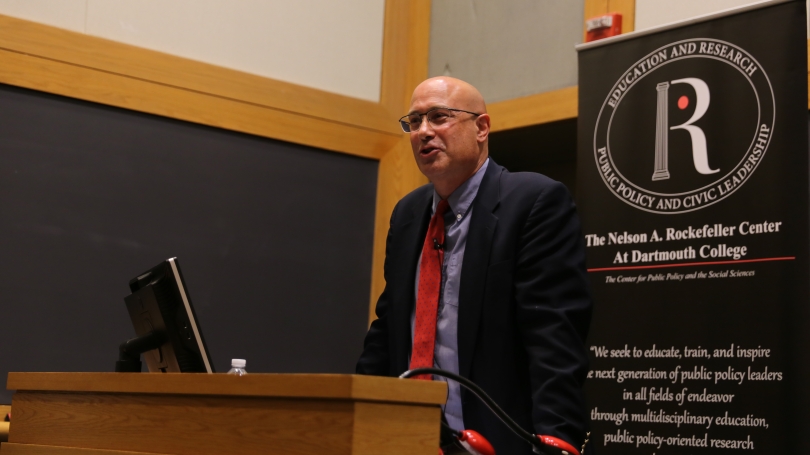
- Public Policy
- Leadership
- Funding
- News & Events
- About the Center
Back to Top Nav
Back to Top Nav
Back to Top Nav
Back to Top Nav
This Constitution Day, September 17, 2019, Boston College Professor of Political Science Ken I. Kersch delivered the Brooks Family Lecture entitled, “Conservatives and the Constitution.” In addition to the lecture, Professor Kersch had lunch with a group of students.
The lecture focused on a subject explored in his most recent book, Conservatives and the Constitution: Imagining Constitutional Restoration in the Heyday of American Liberalism. The book focuses on the role “originalist” legal theory played in the coalescing of the modern conservative movement and on implications this history carries for modern-day politics. “It is a story about how the conservative movement ultimately becomes a key constituent of the Republican party and ultimately takes over the Republican party.”
Though Professor Kersch is, strictly speaking, a political scientist, Conservatives and the Constitution explores politics, history, and legal theory. It is a subject that has interested him for a while, and in particular, since President Trump’s election. He describes the book as “looking at what a group in power was saying before it got its talking points.” In this case, the group in power is conservatives and the talking point is originalism, a theory of law that holds that the constitution should be interpreted in light of how the founders saw it.
In the 1950s, before originalism became “conservative orthodoxy,” there was rigorous debate within the conservative movement, and across the country, on how to interpret the Constitution. According to Structuralists, the true intents of the Founders are expressed in the structure of the American political system, as it is laid out in the Constitution. The Moralists, however, were more concerned with the principles expressed by founding documents like the Declaration of Independence.
Amidst this debate, conservatives rallied behind a call for judicial restraint. This “movement-based Constitutional theory,” as Kersch describes it, united seemingly incompatible groups of people: racists and segregationists, ex-socialists and the religious right.
This is the coalition — today, held together by a common interest in the Supreme Court — that voted for President Trump. Will it last? Kersch says no, though to him, the more relevant question is, “How long will it last?”
As he sees it, another key takeaway is that seemingly cut-and-dried legal theory is anything but. Although lately much political attention has been directed toward the courts, he wouldn’t describe the courts as “politicized,” because that would imply that they were at one point not political. “Everything is political, as far as I’m concerned,” Kersch said. “But not everything looks political.”
As an example, he points to originalism, which may at first present as a highly academic legal philosophy, but in the early stages of the conservative movement, they “had no problem with saying that interpreting the Constitution in this way was consistent with conservative thought,” he said. They even used it as a “banner,” or a call to unite. Now, with American courts filled with officials like Neil Gorsuch, a Supreme Court Justice and Political Philosophy Ph.D., and with divisive issues like gay marriage and abortion, the inherently political nature of our judicial system is newly visible.
Written by Eliza Jane Schaeffer ’20, Rockefeller Center Student Program Assistant for Public Programs